Table of Contents
Dear Aspirants,
Reasoning Ability is an onerous section. With the increasing complexity of questions, it becomes hard for one to give it the cold shoulder. The only way to make the grade in this particular section in the forthcoming banking exams like IBPS Clerk Prelims is to practice continuously with all your heart and soul. And, to let you practice with the best of the latest pattern questions, here is the Adda247 Reasoning Quiz based on the exact same pattern of questions that are being asked in the exams.
Directions (1-2): Study the following information carefully and answer the questions which follow–
Q1. If expression ‘A + B – D + G × Q’ is true then which of the following is true?
A is mother-in-law of Q
Q is daughter-in-law of B
G is nephew of A
B is father of G
None of these
Q2. Which of the following means ‘D is mother-in-law of M’
Directions (3-4): Six persons U, V, W, X, Y and Z having different heights. V is taller than Y, who is not taller than W. X is shorter than U but taller than Z. Y is taller than X but V is not the tallest.
Q3. Who is second tallest?
U
V
W
Y
None of these
Solution:
W>V>Y/U>Y/U>X>Z
Q4. Who among the following is the shortest?
U
V
W
Y
None of these
Solution:
W>V>Y/U>Y/U>X>Z
Directions (5-7): Study the following series and answer the questions referring to the word sequence given below:
RAMO HASG BREW DEAR PULP
Q5. If words are arranged according to the reverse alphabetical series from left to right, then which word is second from the left end?
RAMO
HASG
BREW
DEAR
None of these
Q6. If all the words are arranged according to alphabetical order and then each letter in each of the word is arranged according to alphabetic series then how many letters between the 2nd letter of word which is 2nd from left and 3rd letter of the word which is 2nd from right according to alphabetic series?
Six
Three
Four
Seven
None of these
Q7. If each vowel of each word is changed to its next letter according the alphabetical series, then How many letters are there between 3rd letter of the word which is 2nd from left end and 3rd letter of the word which is 3rd from right end?
2
12
13
11
None of these
Directions (8-10): Each of the questions below consists a question and three statements numbered I, II and III. You have to decide whether the data provided in the statements are sufficient to answer the question. Read all the three statements and Give answer
Q8. In which of the following statement is “Z is smaller than W” definitely true?
Statement:
I. W > U ≥ P = X
II. M < P >S ≥ R > T
III. A < R > B > Z
If the data in statement I and II are sufficient to answer the question, while the data in statement III are not required to answer the question.
If the data in statement I and III are sufficient to answer the question, while the data in statement II are not required to answer the question.
If the data in statement II and III are sufficient to answer the question, while the data in statement I are not required to answer the question.
If the data in either statement I alone or statement II alone or statement III alone are sufficient to answer the question.
If the data in all the statements I, II and III together are necessary to answer the question.
Solution:
All statements are required to answer the questions.
Q9. Amongst 8 students A, B, C, D, E, F, G and H, is the position of G in the top three students in a class test?
Statement:
I. Marks of D are more than the marks of three students. Marks of H are more than at least 5 students. Position of F is 4th in the class.
II. Marks of B are more than the marks of A, while E is not in top 4 students.
III. Marks of E are more than the marks of C but less than the marks of B, whose marks are more than the marks of D. A’s marks are less than the marks of F.
If the data in statement I and II are sufficient to answer the question, while the data in statement III are not required to answer the question.
If the data in statement I and III are sufficient to answer the question, while the data in statement II are not required to answer the question.
If the data in statement II and III are sufficient to answer the question, while the data in statement I are not required to answer the question.
If the data in either statement I alone or statement II alone or statement III alone are sufficient to answer the question.
If the data in all the statements I, II and III together are necessary to answer the question.
Solution:
All statements are required to answer the questions.
Q10. If a row of 7 persons A, B, C, D, E, F and G, who are facing north. Are B and E adjacent to each other?
Statement:
I. There are only two students between A and G. D is fourth to the right of C.
II. B is second to the left of F, who is at one of the extreme end of the row. G is third to the right of C, who is not near to A.
III. E is fourth to the left of D, who is third to the right of A.
If the data in statement I and II are sufficient to answer the question, while the data in statement III are not required to answer the question.
If the data in statement I and III are sufficient to answer the question, while the data in statement II are not required to answer the question.
If the data in statement II and III are sufficient to answer the question, while the data in statement I are not required to answer the question.
If the data in either statement I alone or statement II alone or statement III alone are sufficient to answer the question.
If the data in all the statements I, II and III together are necessary to answer the question.
Solution:
Statement II and III are sufficient to answer the question.
Directions: (11-15): Study the following information carefully and answer the questions which follow
Ten players A, B, C, D, E, F, G,I, J and H are sitting in two parallel rows in such a way that persons in one row is exactly facing another person in the other row.
E is 3rd to the right of C, who is opposite to D. D is facing to the one , who is 2nd to the left of A. F is 2nd to the right of B, who is not near to A. G is not near to H but immediate right of J, who is not near to D. H sits opposite to the one who is fourth left to E. C and J is not sitting at any extreme end. B and E are in same row. I is not facing north.
Q11. Who sits opposite to I?
B
E
A
H
None of these
Q12. Which of the following is true with respect to the given information?
C is sitting diagonally opposite to B.
A is sitting opposite to the J, who is immediate right of G.
B is sitting opposite to H.
B is sitting opposite to H and faces south.
None of these
Q13. Who is seated between G and H?
J
F
A
D
C
Q14. Who sits second to the right of A?
J
F
H
D
no one
Q15. Who among the following sits at an extreme end?
I
F
C
D
none of these
You may also like to Read:





 The Hindu Review October 2022: Download ...
The Hindu Review October 2022: Download ...
 IRDAI Assistant Manager Score Card 2024 ...
IRDAI Assistant Manager Score Card 2024 ...
 IRDAI Assistant Manager Prelims Cut Off ...
IRDAI Assistant Manager Prelims Cut Off ...




